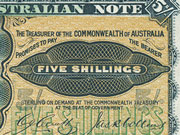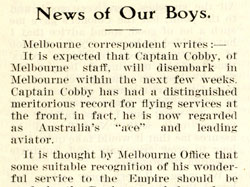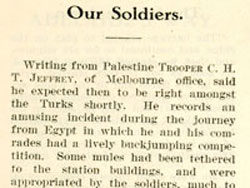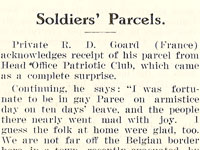From Bank to Battlefield
Challenges of War
When World War I broke out, the Commonwealth Bank was just two years old. The enormity of the challenge facing the fledgling organisation is unimaginable as it sought to establish itself as a national institution at the same time as it grappled with the consequences of war for the nation – and for its staff.
Summary of Wartime Activities
The First World War provided significant challenges for the Commonwealth Bank. In particular, its role in organising finance for Australia's war effort through the successful War and Peace Loan campaigns. Confidence in the Commonwealth Bank had grown early on when, after war was declared, it promptly paid any depositors wishing to withdraw their savings from the Bank. This act allayed any fears, held by some writers and members of the general public, that the war would see the collapse of the banking system due to a run on the banks. By paying all withdrawals without question and providing a guarantee that other banks would do the same, the public were satisfied that their money was safe and the expected mass withdrawal of deposits never occurred.
The Commonwealth Bank also became known as the Digger's friend. Following on from the successful campaign started in 1912 to put Commonwealth Savings Bank agencies on board Australian naval ships, the Bank extended this to the Australian Imperial Forces and opened branches around Australia and abroad. In addition, any soldier who wished to cash Australian notes or silver could do so through one of the Bank's many overseas agents at a pre-negotiated rate.
At training camps in Australia and the United Kingdom, and branches in London and beyond, Bank staff assisted soldiers, with all charges borne by the Bank. In cooperation with the Red Cross, the Bank also ensured that many prisoners of war had access to funds, thus allowing them, in many cases, to purchase a few comforts while being confined under terrible conditions. The Bank also assisted dependents of Australian soldiers, including war widows, whose pensions were paid free of charge.
Staff of the Bank formed a Patriotic Club and regularly sent parcels to soldiers stationed overseas. The grateful thanks of recipients, often accompanied by stories of their exploits abroad, was recorded in the staff magazine, Bank Notes.
And when hostilities ceased, the War Service Homes Department of the Bank ensured that homes were built or purchased at favourable rates in each state for those returned soldiers, sailors, nurses, munition and war workers and their female dependents who required housing. In this small way, the Bank was seen to be helping those who had fought for the Empire's, and Australia's, freedom.
In a short space of time, and due to the efforts of the Bank to assist the war effort and Australian soldiers, wherever they were stationed, the Bank and Governor Miller became synonymous with stability and strength, and their activities, within Australia and on the world stage, generated great public pride and patriotism. The Commonwealth Bank's role during the war years cemented it firmly within the collective psyche as an enduring Australian institution and a bank for and of the people.
Responsibilities of the Bank and its Leader
Prime Minister Andrew Fisher's decision to appoint Denison Miller as the first Governor of the Commonwealth Bank was an inspired one. The Bank's reputation, he maintained, would depend on the qualities of the person appointed to lead it through its early years.
Fisher made this clear when he introduced the Commonwealth Bank Bill into Parliament in 1911. He wanted the Commonwealth Bank to be a successful commercial enterprise. Having established itself, the Bank might then evolve naturally into a central bank.
Miller dedicated himself to fulfilling these ambitions. He was determined that the Bank would soon be known for its competence and enterprise. These were the skills that he himself brought to the Bank as a former commercial banker, second-in-charge of the Bank of New South Wales, Australia's oldest and most respected bank. But he was also determined to see the Bank develop as a central bank. The First World War was to assist him in this process.
As banker to the Commonwealth Government, the Bank was responsible for the massive loan raisings required to meet the demands of war and postwar reconstruction, and for financing the country's export trade. During the war, Miller petitioned the government on numerous occasions to transfer responsibility for the note issue from the Treasury to the Commonwealth Bank. The first step occurred in 1920 when the Australian Notes Board was established within the Commonwealth Bank, with Miller as Chairman.
The Bank provided additional liquidity to banks during the postwar depression in the early 1920s in a successful attempt to stabilise the financial system. Miller also urged the banks to settle their balances by cheques drawn on deposits held at the Commonwealth Bank, a process eventually forced upon the banks by the Commonwealth Bank Act of 1924. These were significant steps toward the creation of central banking in Australia.
Historians have justly praised Denison Miller for the leadership he exhibited as Governor of the Commonwealth Bank, creating as he did one of the nation's greatest financial institutions, of which the Reserve Bank of Australia is the legal successor.
Selwyn Cornish
Official Historian
Reserve Bank of Australia
Reflections of the Governor, Glenn Stevens
Sir Denison Samuel King Miller, the founding Governor of the Commonwealth Bank of Australia, knew well the demands of war. After the outbreak of the First World War in 1914, the bank he led played its proper part as a national institution in helping to arrange wartime financing. The Bank's officers and staff also made a very direct contribution: as Miller later recorded, a remarkably high proportion of the men employed by the Bank enlisted. The war was quite personal for Miller. Three of his four sons enlisted; one died on the Western Front in 1917.
Miller's correspondence with members of the Bank's staff during the war years provides a window into the times. In reproducing these and other documents from its archives, the Reserve Bank is seeking to make a small contribution to the marking of those terrible events.
Lest we forget.
Glenn Stevens
Governor
August 2014
Emergency Issue Banknotes
Due to a shortage of banknotes following the outbreak of war, it had been necessary to produce some special notes. One of these, which came to be known as the Rainbow Note, was an ‘emergency issue’ of the one pound note. It was circulated in 1914 and, because it had no security features, could be printed quickly. However, it could also easily be copied. Counterfeits soon appeared and the note was withdrawn in April 1915. Another special note, a five shilling denomination, was prepared for issue during 1916 when it was estimated that, due to a rise in the price of silver, the coins would be more expensive than the value of the coins themselves. As it turned out, however, the paper note was never issued.
News of Our Boys
The Commonwealth Bank's staff magazine, Bank Notes, played a vital role in keeping staff at home informed about their friends and colleagues on the frontline. The regular columns headed ‘News of Our Boys’ and ‘Our Soldiers’ provided a glimmer of hope for the close-knit employees who had only just launched the institution under the watchful eye of Governor Denison Miller. The burden of worry carried by the Governor was enormous. As well as the fate and fortune of his staff in Australia and overseas, and the Bank's capacity to fund the war effort, the Governor's three sons were all on active duty. For Bank staff, his courage, strength and loyalty were a beacon in the dark war years. It's no wonder that some of the enlisted men wrote to him about their experiences – even as they faced death on the frontline.
News of Our Boys.
Melbourne correspondent writes:– It is expected that Captain Cobby, of Melbourne staff, will disembark in Melbourne within the next few weeks. Captain Cobby has had a distinguished meritorious record for flying services at the front, in fact, he is now regarded as Australia’s “ace” and leading aviator.
It is thought by Melbourne Office that some suitable recognition of his wonderful service to the Empire should be made by the Bank as a whole, and we would suggest that each capital branch forward a letter of welcome to him care of Melbourne Office and Melbourne will do the rest.
Mr. Jas. White writes a long interesting letter to Mr. H. T. Armitage from Moascar under date 4th April, mentioning amongst other things the native uprisings have assumed such proportions as to retard demobilisation of our Palestine Army somewhat.
Gunner V. H. Woodward (Perth), writing from Belgium, under date 15th March, expresses good wishes to all old friends, and his gratitude at receipt of his Christmas bonus.
R.Q.M. Sergeant G. L. Bingham, of Perth also, writing from London, expresses his thanks for receipt of the bonus, and the earnest hope that he will be with us before the end of the year.
Perth branch is pleased to have back again Private E. J. Bray, who after nearly three months’ convalescence from his severe attack of Spanish influenza, has now quite recovered.
Mr. G. H. Ford, who left Perth Staff in May, 1915, to join the A.I.F., has now returned. He left Western Australia in June, 1915, with the 28th Battalion, went through the Gallipoli campaign; was at London Office, and with the 8th Battery in the big push, finishing up at Brussels. He has now returned after his four years’ service, and rejoined the staff.
News comes through of Driver A. Stewart, the genial Head Office man with the infectious grin, who used to handle infuriated crowds at the cable counter, with so much tact and good humour, in the “off” seasons, when cables were slower than mail boats. When last seen by Mr. B. C. Cannon, of our Tidsworth Branch, he was a burly driver in the overworked A.S.C., all unshaven and unshorn. In fact, when first sighted, there were unworthy suspicions of bushrangers, Bolsheviks, etc., but a closer acquaintance revealed the old Alex., of the comfortable embonpoint! Source: Bank Notes magazine – June 1919
Our Soldiers
Writing from Palestine TROOPER C. H. T. JEFFREY, of Melbourne office, said he expected then to be right amongst the Turks shortly. He records an amusing incident during the journey from Egypt in which he and his comrades had a lively buckjumping competition. Some mules had been tethered to the station buildings, and were appropriated by the soldiers, much to the disgust of the “nigger” owners. During the ensuing revels and altercations the troop train moved off, and the winner of the competition had much difficulty in boarding the last carriage of the departing train.
The following interesting letter from PRIVATE R. J. RYAN, of Adelaide Branch, was recently received from Codford Camp, England, under date 14th July, 1918: “Our trip across the Mediterranean from Port Said to Marseilles was rather exciting, as our vessel travelled with a large convoy, and we were attacked by enemy submarines five times, each on different days, and three vessels were torpedoed, two being sunk by shell fire from submarines, and a third one was torpedoed. This was compensated for somewhat by the fact that our escort sank three enemy submarines, and I personally saw two destroyed. Our vessel had a very narrow escape, as a torpedo, which was fired at us, missed the bow of the ship by a few feet, the wake of the torpedo being plainly visible, and caught a French steamer 50 yards to starboard. Several people were drowned, but the vessel was beached on the African coast. We arrived safely in Marseilles on May 11, and then entrained for our journey through France. We travelled north to Versailles, and then coast-wards to Havre, and followed the valleys of the River Rhone, and Seine, for a considerable distance. The scenery of Southern France is magnificent, and I spent a pleasant and interesting time watching the countryside as our train moved along. We only stayed at Havre one day, and then crossed the channel during the night to Southampton thus finally reaching England on May 15th.” Whilst in England Private Ryan met Mr. Keats, one of our staff on service at London Branch.
LILET.-COLONEL C. H. T. LAYH, of our Melbourne Staff, who was awarded a D.S.O. in the
1917 New Year Honours, has now received a bar to the order, for arranging a brilliant
counter attack, taking hundreds of prisoners and capturing 120 machine guns.
Rumours were rife that MAJOR L. J. FUSSELL, M.C., of Head Office, who has had a most
distinguished and successful military career, had been taken prisoner of war. Exhaustive
enquiries have been made of the Military Authorities and Red Cross, and it is believed
the rumours are quite without foundation.
LTEUT. CHARKER, of Head Office, who is a prisoner of war at Bad Colberg, Germany, writing under date 14/5/18, seems well and cheerful. Describing himself, he says: “Hair very short where there is any. Nose lopsided through an over-indulgence in the pastime called boxing, the rest like a sack of chaff tied in the middle, through having nothing to do and a long time to do it in.” Lieut. Charker, who concludes with best wishes to all the staff, limns his portrait with a rather unflattering brush. We’ll all be delighted to see him once more, and here’s to his speedy release from durance vile!
CORPORAL V. F. MITCHELL (Melbourne), who has been training as an air mechanic at Laverton for some months, embarked for the front recently.
GUNNERS WADMORE, DAVIDSON and KEMPSON, of Melbourne, who were in camp together at Maribyrnong, are now in France with the 35th Field Artillery.
TROOPER C. H. T. JEFFREY (Melbourne) has arrived in Egypt with the Light Horse.
AIR MECHANIC J. V. CORNELL (Melbourne) is studying hard at Laverton, and hopes soon to gain his pilot’s certificate.
PRIVATE A. R. DUTNEALL, late of our Melbourne Staff, who for some weeks was reported “missing,” has now been discovered a prisoner of war in Germany.
GUNNERS A. R. DRAFFIN and T. L. KING (Melbourne) are working together at Queenscliff in the Royal Australian Garrison Artillery.
PRIVATE S. R. SELLECK, of Melbourne, has just completed his final leave, and hopes to embark very shortly.
MAJOR ROBERT SABESTON (Melbourne) has recently been promoted, and is now second in command of the Pay Corps in London.
STAFF SERGEANT-MAJOR STALLWOOD, formerly of Ballarat Branch, has now returned to Australia.
LIEUT. J. A. D. SOMER has returned to his unit in France after a spell of duty in London Office.
TROOPER HOCKING, of Geelong, left with Light Horse Reinforcements on the 14th October.
SAPPER E. G. WADE, who is attached to the 2nd Divisional Signal Company, is now in London Office for a time.
PRIVATES E. A. CUMMINS and J. C. H. JOHNS have recently entered Broadmeadows Camp, and are training with the Infantry Reinforcements.
ACTTING-CORPORAL E. B. KANEEN, who is also at Broadmeadows, has lately been promoted.
SERGEANT R. C. RUSCHPLER, who was taken prisoner by the Germans, after many thrilling events, made his escape from the country, bringing back valuable information. He has resumed duty with the Bank, and is at present temporarily employed in our London Office.
We learn that BOMBARDIER F. F. LEAK, of our Adelaide Staff, who was suffering from gunshot wounds, is now in hospital in London, and progressing favourably.
Head Office men will recall with interest E. P. McPHEE, who was transferred to Orange. He is now proceeding to fight the Turk. The genial Mac. has for his O.C. at the training school in Egypt none other than Lieut. Upton, also of Head Office.
Patriotic Club
The 275 members of the Commonwealth Bank's Patriotic Club produced an array of gifts and trinkets to lift the spirits of soldiers heading to war as well as those returning. These included a boomerang-shaped card with the message ‘Godspeed and a Safe Return’ for those who were leaving. A greeting card, shaped like the map of Australia with the message ‘Welcome to your Homeland’, was handed to those coming back. The Club also despatched Christmas parcels to every member of staff on active service. These were gratefully received, as this message from Private GC Canon to the staff magazine, Bank Notes, reveals: ‘… I had just returned… to England after twelve months' navvying and fighting, and I can assure you it was a treat to eat some biscuits that had sugar in them.’
Transcript from Bank Notes Magazine, February 1919, Page 6.
Soldiers' Parcels.
Private R. D. Goard (France) acknowledges receipt of his parcel from Head office Patriotic Club, which came as a complete surprise.
Continuing, he says: “I was fortunate to be in gay Paree on armistice day on ten days’ leave, and the people there nearly went mad with joy. I guess the folk at home were glad, too. We are not far off the Belgian border here, in a town recently evacuated by Fritz, and the inhabitants are very happy after saluting the Hun officers for four years.”
Sergeant H. P. Jones (Magdalene College, Oxford): “It is with great pleasure I send this note conveying my best thanks to you all for good wishes and parcel.”
“Although not actually in the field when the parcel reached me, nevertheless I very much appreciated the thoughts that prompted its being sent.”
Sapper W. H. Wilson, writing from Port Said, amongst other things, says: “I left my unit, the Imperial Cavalry, near Aleppo, and they carried on to the coast to garrison for winter. Had a very interesting trip across the Lebanon Mountains – winter had just commenced here – to Beyrout (a town equal to Brisbane in size), where I took ship to Alexandria, thence to here by train. Expect to move on to Details Camp at Moascar this week. Meanwhile I asked to be allowed to proceed to England or Australia for the purpose of rendering some assistance to the good work carried on by the Commonwealth Bank for the troops. Have been advised in reply that it will be necessary to await de-mobilisation. The details of the scheme for our return are not definitely known here, but you doubtless will be apprised of them in advance.”
Private G. C. Cannon writes: “Just a few lines to thank you for the parcel. I had just returned from leave to England after twelve months’ navvying and fighting, and I can assure you it was a treat to eat some biscuits that had sugar in them. I was in London on armistice day, and believe me it was some sight. I think it will be somewhere about twelve months before I see Australia again, and it is possible that London Office will have something to say about our return, many of the B and C Class men being employed there now. I have been lucky in escaping wounds and sickness. At present we are about to start on a 160 mile route march to somewhere in Germany, and I expect we will be doing guard and garrison work there for three to six months”
Sergeant S. M. Ryan of Sydney Office, writes from Cairo: “The climate here now is nearly ideal, and it is no wonder that heaps of people come to Egypt for the winter. Have been in Cairo for nearly four months now, being marked T.B. for six months, but won’t be sorry when the time's up to get back with the boys again, as I rather like the novelty of the rough life and the horses.”
Captain L. H. Morris, writing from our Weymouth Branch: “Parcel arrived at a particularly happy time, and it is good to know that comforts will not be very much longer necessary for our men in the field. Most of them have had enough of it.”
Corporal L. C. Clinch, of Head Office, writes a graceful acknowledgment of his parcel.
A Battle of Another Kind
Just as the First World War was ending, Australians had another battle on their hands – the Spanish flu pandemic. The 1918 flu pandemic was an unusually severe and deadly influenza pandemic that spread across the world from June 1917 to December 1920, killing between 50 and 100 million people. Commonwealth Banks staff member EJ Bray survived the war in Europe, only to be sent home on board the transport Boonah, on which an outbreak of the disease was discovered as the voyage progressed. He survived, but not without being placed on the ‘Danger’ list and enduring three months’ convalescence.
In Sydney, the Minister for Public Health wrote to the Governor about the possibility of disinfecting notes before reissuing them. His suggestion was to expose the used notes to saturated steam under pressure. At that time, note issue for Australia was under the control of the Commonwealth Treasury. The Governor forwarded the suggestion there.
The Bank did, however, take some special steps as a result of the pandemic. From 22 April to 19 May 1919, it closed at midday. As the Governor advised, this was because his depleted staff had been working for some time at high pressure: ‘…it was felt that, in order that their power of resistance to the epidemic might not be unduly lowered, it was necessary that the strain should be relaxed’.
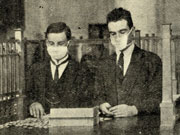
The Governor also insisted that his staff wear masks. Reporting on this, Bank Notes, the Commonwealth Bank’s staff journal, noted: ‘The following day many large city firms, Government institutions and private citizens, followed our lead by adopting the mask, and Mr Denison Miller was complimented on more than one occasion for his quick action and splendid example.’

